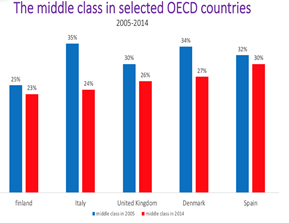The Institutional Political Economy of the Middle Class in Developed Countries
Sagit Azari-Wiesel, PhD, Graduated BMI Fellow
Academic Advisor: Prof. Itai Sened

Following the financial crisis of 2007-8, the strength and vulnerabilities of the middle class have come to occupy a central role in the discussion of economic recovery. Despite the interest in the middle class, rigorous scholarship of the subject has been sparse. This neglect may be correlated with the standard method used by most economists to measure the strength of the middle class, almost invariably, by different cut-points of income distributions and by virtually none existing theory to explain the economic imperatives of the middle class as a critical economic engine for economic long term growth.
The results of analysis of the three cases of Israel, the UK, and Italy indicate a significant change in class structure, to more polarized class stratification. What distinguishes the poor from the middle class, are quality employment, education, real estate, excess pension, and health care. These conclusions notwithstanding, found significant variance across the cases studied. For example, in Israel, the core middle class does not need more housing, (while the new middle class does), but rather infrastructure that will make the labor market more accessible to members of the middle and lower classes. The lower class in Israel needs more skills adapted to the modern labor market, while in Italy, the lower class, first of all, requires new and unique incentives to enter the labor market. In the UK, it seems to be all about an educational system that has left the middle class desperately behind the educational needs of the current labor markets.
